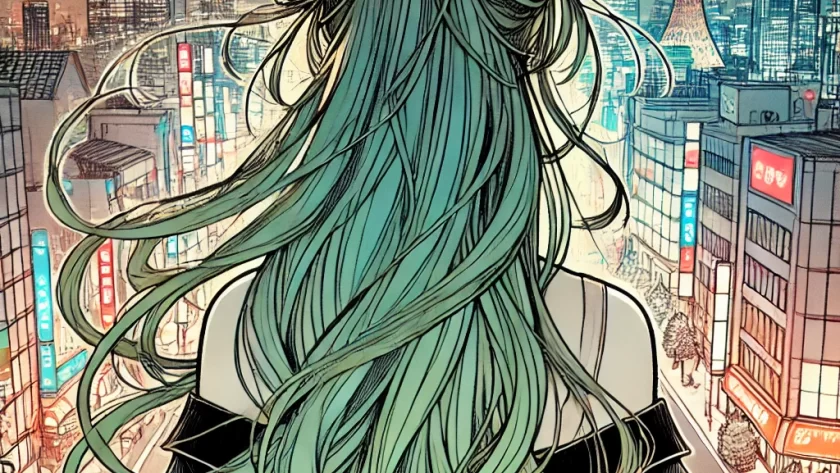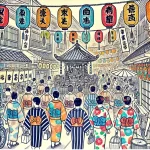トウキョウ・シャンディ・ランデヴ [Tōkyō Shandi Randevu]
MAISONdes feat. 花譜, ツミキ [Mezon De feat. KAF, Tsumiki]
Words & Music : ツミキ [Tsumiki]
This time, I will introduce “Tokyo Shandy Rendez-vous,” a song by the musical project “MAISONdes,” which features different singers and producers for each song.
The vocalist is a “virtual singer” named “花譜 / KAF.” There seems to be some confusion online about what “virtual singers” are, as they involve new technology and culture. One type refers to voice synthesizer software like “Hatsune Miku wiki” (known as Vocaloids), and their characters. Another type refers to singers who perform using avatars without showing their faces (mainly YouTubers, called “VTubers”). I don’t use voice synthesizer software much, but at least in the composition stage, it’s convenient to include demo vocals. Therefore, many composers in Japan nowadays use it. Among amateur music creators, there are those called Vocalo-P who actively release works within the culture of Vocaloids.
“花譜 / KAF” is a virtual singer who performs as a human singer. However, an audio library for voice synthesizer software called “可不 / KAFU” was created from her voice and released in 2022. So, there is a non-human version of KAF as well. Anyway, this song “Tokyo Shandy Rendez-vous” was produced by Tsumiki, who is also a Vocalo-P, and sung by KAF.

On the other hand, this song was adopted as the theme song for the 2022 version of the classic and hugely popular anime “うる星やつら / Urusei Yatsura YT,” based on Rumiko Takahashi wiki‘s manga. This manga, which began serialization in 1978, is a comedy centered on the character Lum, who is devotedly in love with the protagonist, creating a huge boom. “MAISONdes” is responsible for the overall theme songs for the 2022 version of “Urusei Yatsura,” and Lum appears in the music videos for these songs.
電波テンポアップして絶賛感電中! ワッ
denpa tenpo appu shite zessan kanden chū wa
- 電波(でんぱ) [denpa] : radio wave
- テンポアップ [tenpo appu] : speed up
- 感電(かんでん) [kanden] : electric shock
(translation) “Speeding up the tempo like radio waves, currently in the midst of an electric shock! Wow”
The word “ワッ / wa” (=Wow), which is used to express surprise, is interesting.
Since the lyrics are long and many, I will explain them at a faster pace than usual, focusing only on the most important words.
あなたにもわすれたいことかなしいこと
anata ni mo wasuretai koto kanashii koto
あるのかしらね
aru no kashira ne
識らない映画なのに涙をながすのは
shiranai eiga nanoni namida o nagasu no wa
ドラマチックが足りていないからよ
doramachikku ga tarite inai kara yo
- あなた(あなた) [anata] : you
- 忘れる(わすれる) [wasureru] : forget
- 悲しい(かなしい) [kanashii] : sad
- 知る(しる) [shiru] : know
- 映画(えいが) [eiga] : movie
- 涙(なみだ) [namida] : tears
- ドラマチック [doramachikku] : dramatic
- 足りる(たりる) [tariru] : enough
(translation) “Do you also have things you want to forget and sad things?
Even though it’s a movie you don’t know, you cry
because there is not enough ‘dramatic’.”
The part “ドラマチックが足りていない” (=There is not enough ‘dramatic’.) is cool.
そんな愚にも付かないこと くだらないこと考えてばかりね
sonna gu ni mo tsukanai koto kudaranai koto kangaete bakari ne
雨が上がれば愛もその横顔も 誰かのものになるのでしょう
ame ga agareba ai mo sono yokogao mo dareka no mono ni naru no deshō
- 愚にもつかない(ぐにもつかない) [gu ni mo tsukanai] : pointless
- くだらない(くだらない) [kudaranai] : trivial
- 雨が上がる(あめがあがる) [ame ga agaru] : stop raining
- 愛(あい) [ai] : love
- 横顔(よこがお) [yokogao] : profile
- 誰か(だれか) [dareka] : someone
(translation) “Thinking only about such pointless and trivial things.
When the rain stops, love and your profile will belong to someone else.”
嘘っぱちのファンデーションも全部
usoppachi no fandēshon mo zenbu
今夜のためよ
kon’ya no tame yo
なのに一体全体 如何して如何して 何故何故?
nanoni ittai zentai dōshite dōshite naze naze hatena
- 嘘(うそ) [uso] : lie
- ファンデーション [foundation] : foundation
- 全部(ぜんぶ) [zenbu] : all
- 今夜(こんや) [kon’ya] : tonight
- ため [tame] : for
- なのに [nanoni] : but
- なぜ [naze] : why
- はてな [hatena] : question mark
(translation) “Even the fake foundation is all for tonight.
But why, why, why, why?”
The word “はてな / hatena” is often used to express a question. Question mark is “はてなマーク / hatena māku” in Japanese. Of course, we don’t pronounce the question mark itself, but here it’s read as “hatena.” It has a somewhat childish nuance, similar to something an anime character might say. It overlaps with the image of Lum from “Urusei Yatsura.”
The exclamation mark is called “びっくりマーク / bikkuri māku.”

不安定なカンテラ何処まで行くの
fuantei na kantera doko made iku no
あなた一切合切放り去ってもう
anata issai gassai hōri satte mō
- 不安定(ふあんてい) [fuantei] : unstable
- カンテラ [kantera] : lantern
- どこ(どこ) [doko] : where
- 行く(いく) [iku] : go
- あなた [anata] : you
(translation) “Unstable lantern. Where are you going with that ?
You’ve thrown everything away.”
Ah 冗談じゃあないないわ
Ah jōdan jaa nai nai wa
トウキョウ・シャンディ・ランデヴ
Tōkyō Shandi Randevu
その時が来たって如何にもならないぜ
sono toki ga kita tte dō ni mo naranai ze
曖昧な本当なんてメランコリ化するだけ
aimai na hontō nante merankori-ka suru dake
あたしを さあ掻攫って今テイクオンミー イエス
atashi o sā kassaratte ima teiku on mī Iesu
- 冗談(じょうだん) [jōdan] : joke
- ランデブー [randevū] : rendezvous
- 曖昧な(あいまいな) [aimai na] : ambiguous
- 本当(ほんとう) [hontō] : truth
- あたし [atashi] : I
- 掻っ攫う(かっさらう) [kassarau] : snatch
(translation) “You must be kidding!
Tokyo Shandy Rendez-vous.
Even when the time comes, it won’t change anything.
An ambiguous truth just turns into melancholy.
Snatch me away now, yes.”
“Shandy” is a beer-based cocktail. In a previous section, I didn’t know that “kantera” is a word of Dutch origin.
The word “メランコリ化 / merankori-ka” (=melancholization) is not commonly used, but it’s interesting how Japanese can quickly adapt foreign words into compounds.
“ランデブー / randebū” is a French-derived word, but it’s generally used in Japan. However, it has become somewhat old-fashioned, and nowadays “デート / dēto” (=date) is more commonly used.

はあ ちゃんちゃらおかしな法度ばっかで
haa chanchara okashina hatto bakka de
食指がびくともしないわ
shokushi ga bikuto mo shinai wa
実態の無い感情放っておいたって
jittai no nai kanjō hotte oitatte
策略なんてありゃあせんのに何故 umm
sakuaku nante aryasen noni naze umm
ああ もう懲り懲りよ
aa mō korigori yo
あたしの喝となる気質も じっと堪えて取り繕ってはとうとう臨界点
atashi no katto naru kishitsu mo jitto taete toritsukurotte wa tōtō rinkai ten
(translation) “Hah, it’s all absurd rules.
My appetite doesn’t even budge.
Even if I leave my insubstantial emotions alone,
there are no schemes, so why…umm.
Ah, I’m already fed up.
Even my fiery nature,
I’ve endured and pretended, and finally reached the breaking point.”
A very interesting rap has started.
In Japanese, there’s a very important concept called “pitch accent“, which differentiates homophones by varying the pitch (high and low) of the pronunciation. This is difficult for foreigners, and it seems this aspect of learning is often neglected, but in songs, the lyrics follow the melody, so pitch accent doesn’t matter.
However, in the first half of this part, the rap follows the natural Japanese pitch (without musical notes) quite closely. It’s very cool.
I’ll omit the word list here. “ありゃせん / ariyasen” is a dialect. Lum also uses a distinctive dialect despite being an alien.
年がら年中リップサービス 鈍感カマしては辟易
nengara nenjū rippu sābisu donkan kamashite wa hekieki
どんがらがっしゃんフィールガールは涙の目にも鬼
dongara gasshan fīru gāru wa namida no me ni mo oni
今や頭の中のミュージックのせいであなたの話は一向に聴き取れない
ima ya atama no naka no myūjikku no sei de anata no hanashi wa ikkō ni kikitorenai
少しは真当なこと言って yeah
sukoshi wa mattō na koto itte yeah
(translation) “Year-round lip service, acting insensitive is exhausting.
Crash, bang, feel girl, even tears’ eyes shed demons.
Now, because of the music in my head, I can’t hear your story at all.
Say something sensible for once, yeah.”
This time, it’s a more typical rap with musical notes. Let’s compare it with the previous part.
I’ll omit the word list here too. The part where the proverb “鬼の目にも涙 / oni no me ni mo namida” (=Even demons’s eyes shed tears) is messed up is funny lol.
“鬼 / oni” is a strong and scary demon that often appears in Japanese folktales, characterized by horns on its head and a loincloth made of tiger skin. Since Lum is an oni-like alien, such lyrics likely appeared.

回り出すターンテーブル
mawaridasu tān tēburu
ねえ全部忘れさせてよ
nee zenbu wasure sasete yo
だけど一体全体 如何して如何して 何故何故?
dakedo ittai zentai dōshite dōshite naze naze hatena
不安定なカンテラ消えない儘ね
fuantei na kantera kienai mama ne
あなた一口両舌食い違ってもう
anatai ikkō ryōzetsu kuichigatte mō
- 回る(まわる) [mawaru] : turn
- ターンテーブル [tān tēburu] : turntable
- 食い違う(くいちがう) [kuichigau] : disagree
(translation) “The turntable starts spinning.
Hey, make me forget everything.
But why, why, why, why?
The unstable lantern doesn’t go out.
You’ve disagreed with your double-tongue.”
冗談じゃあないないわ
jōdan jaa nai nai wa
トウキョウ・シャンディ・ランデヴ
Tōkyō Shandi Randevu
その時が来たって如何にもならないぜ
sono toki ga kita tte dō ni mo naranai ze
曖昧な本当なんてメランコリ化するだけ
aimai na hontō nante merankori-ka suru dake
あたしを今
atashi o ima
冗談じゃあないないわ
jōdan jaa nai nai wa
トウキョウ・シャンディ・ランデヴ
Tōkyō Shandi Randevu
その時が来たって如何にもならないぜ
sono toki ga kita tte dō ni mo naranai ze
不甲斐ないわ
fugainai wa
感情なんてランドリーで落とすだけ
kanjō nante randorī de otosu dake
あたしと確かめ合ってイエローマジック
atashi to tashikameatte Ierō majikku
アイヤイヤ
aiyaiya
トウキョウ・シャンディ・ランデヴ
Tōkyō Shandi Randevu
その時が来たって如何にもならないぜ
sono toki ga kita tte dō ni mo naranai ze
曖昧な本当なんてメランコリ化するだけ
aimai na hontō nante merankori-ka suru dake
あたしをさあ掻攫って今テイクオンミー イエス
atashi o sā kassaratte ima teiku on mī Iesu
There are many nonsensical and sensory words, but some choice of words is quite stylish, giving the lyrics depth.
The way of singing is like an anime character talking. The unique whisper voice by KAF and the super cool EDM funk rhythm by Tsumiki make it even cooler.
It would be amazing if you could sing this. Anyone up for the challenge?
Thanks for reading! Feel free to comment if you have any feedback or questions.
Follow me on X.



